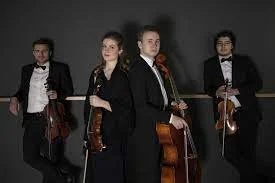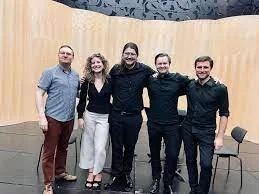THE HEATH QUARTET AT JESUS COLLEGE CHAPEL
The wonderful Health Quartet - off stage
The Heath Quartet are ones to watch as their meteoric career arcs its way over Europe. Today they are magnets for musical awards but they first got together at the Northern College of music. And there is something decidedly Northern about their style – open genial and full of enjoyment. It is catching. They truly relish what they do. The two men,Gary Pomeroy, Christopher Murray and two women Sara Wolstenhome, Juliette Roos make a wonderfully balanced ensemble. From the moment they swept into the cool space of Jesus College Chapel the conversation began between the instruments. They read each other so closely, the musical exchanges are just like voices in a room – with plenty to say.
It always helps to run into a real expert at a concert and I had the luck to hear composer Jeremy Thurlow’s assessment of these superb musicians. ‘Every phrase and each note counts – they make the most of every moment they play”. And so they do,
Unusually, the two violinists Sara and Juliette , switched roles between the pieces. Sara led the Joseph Hayden, String Quartet in B flat with great skill. A familiar work came to life with the ardent super-calibrated bass and cello to transform it into a classically joyous four movements. Who really cares that Josephe sold the score to two sets of vendors at the same time – the quartet endures enjoyably to this day. As the notes filled the darkening Chapel, all the skill of a past master of music made for a superb rendition.
The Heath quartet specialises in the work of Michael Tippett. His string quartet was as far from Hayden as you can get – agitated and troubled. It was written in 1942 after he endured some kind of trauma – and he became an ardent conscientious objector, brutally interned in Wormwood Scrubs for his belief. The piece the Heath played actted as a celebration for his release – his friends rallied to support him in the Wignore Hall. What turbulent, heart rending times they were , a sensitive composer in turmoil between his beliefs and his duty to his country. He had to bear the opprobrium of many at the time – nothing compared however to the virulence of attacks on Ist World War passivists, a mistake society was not to make again. The Heath have recorded all the work of this complicated composer . CDs sold out after the concert.
“ I’ve come for the Ravel” one audience member told me at the beginning of the evening. And by the end of the Heath’s performance of his only concerto, I understood why. She had a long wait but for me it was a complete surprise to discover the depth of this famous composer. Yes, we have all heard his Torvll and Dean Bolero ( and very recent research proves that yes, he wrote every note of that famous piece of music alone), but this was something else.
George Gershwin went to Paris after Rhapsody in Blue to seek advice from Ravel about future work. The French composer told him he didn’t know why Gershwin was there at all” 'Why would you want to be a second-rate Ravel when you can be a first-rate Gershwin?' In this piece Ravel is a first rater himself. It was truly to-division time.. Always inventive, the music morphed from sensitive lyricism to modernist mode, at one point, the bass and cello plucked strings whilst the violins soared spectacularly. St Jean de Luz and the beautiful Basque country flooded the piece; the Heath musicians took us to view seascapes and Pyrenean vastness. Ravel only wrote one such work, but it’s one to re-visit it even includes quotes from fellow composers , Debussy’s Daphnis and Chloe floats into the foreground as Ravel presses on with a wonderful work which deserves more acclaim. As with everything they do, the Heath Quartet did it proud.







